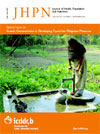
|
The Journal of Health, Population and Nutrition
icddr,b
ISSN: 1606-0997
EISSN: 1606-0997
Vol. 31, No. s2, 2013, pp. 36-47
|
 Bioline Code: hn13077
Bioline Code: hn13077
Full paper language: English
Document type: Research Article
Document available free of charge
|
|
|
The Journal of Health, Population and Nutrition, Vol. 31, No. s2, 2013, pp. 36-47
| en |
Performance-based Incentives to Improve Health Status of Mothers and Newborns: What Does the Evidence Show?
Eichler, Rena; Agarwal, Koki; Askew, Ian; Iriarte, Emma; Morgan, Lindsay & Watson, Julia
Abstract
Performance-based incentives (PBIs) aim to counteract weak providers’ performance in health systems of
many developing countries by providing rewards that are directly linked to better health outcomes for mothers
and their newborns. Translating funding into better health requires many actions by a large number of
people. The actions span from community to the national level. While different forms of PBIs are being
implemented in a number of countries to improve health outcomes, there has not been a systematic review
of the evidence of their impact on the health of mothers and newborns. This paper analyzes and synthesizes
the available evidence from published studies on the impact of supply-side PBIs on the quantity and quality
of health services for mothers and newborns. This paper reviews evidence from published and grey literature
that spans PBI for public-sector facilities, PBI in social insurance reforms, and PBI in NGO contracting. Some
initiatives focus on safe deliveries, and others reward a broader package of results that include deliveries. The
Evidence Review Team that focused on supply-side incentives for the US Government Evidence Summit on
Enhancing Provision and Use of Maternal Health Services through Financial Incentives, reviewed published
research reports and papers and added studies from additional grey literature that were deemed relevant.
After collecting and reviewing 17 documents, nine studies were included in this review, three of which used
before-after designs; four included comparison or control groups; one applied econometric methods to a
five-year time series; and one reported results from a large-scale impact evaluation with randomly-assigned
intervention and control facilities. The available evidence suggests that incentives that reward providers for
institutional deliveries result in an increase in the number of institutional deliveries. There is some evidence
that the content of antenatal care can improve with PBI. We found no direct evidence on the impact of
PBI on neonatal health services or on mortality of mothers and newborns, although intention of the study
was not to document impact on mortality. A number of studies describe approaches to rewarding quality
as well as increases in the quantities of services provided, although how quality is defined and monitored
is not always clear. Because incentives exist in all health systems, considering how to align the incentives
of the many health workers and their supervisors so that they focus efforts on achieving health goals for
mothers and newborns is critical if the health system is to perform more effectively and efficiently. A wide
range of PBI models is being developed and tested, and there is still much to learn about what works best.
Future studies should include a larger focus on rewarding quality and measuring its impact. Finally, more
qualitative research to better understand PBI implementation and how various incentive models function
in different settings is needed to help practitioners refine and improve their programmes.
Keywords
Health systems strengthening; Pay for performance (P4P); Performance-based financing (PBF); Provider payment mechanisms; Results-based financing (RBF)
|
| |
© The Journal of Health, Population and Nutrition
Alternative site location: http://www.jhpn.net
|
|
